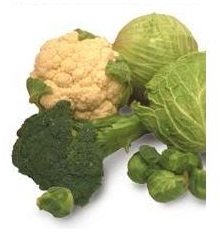What are the Most Nutritious Vegetables?
Vegetables
Naturally, all vegetables are nutritious. They provide the most extensive range of nutrients of any class of food. They are great sources of vitamins, minerals, antioxidants, carbohydrates (including fiber) and proteins. The small amounts of fat they do contain are healthy fats that are essential to the body. Vegetables are very high in nutritional value and low in calories.
So, what are the most nutritious vegetables? Let’s look at a few different types:
Cruciferous Vegetables
Brussels sprouts, broccoli, cauliflower, cabbage, and rutabaga are some cruciferous vegetables.
Not only do cruciferous vegetables contain valuable nutrients, they also contain substantial amounts of important disease-fighting phytochemicals called isothiocyanates, particularly sulforaphane and indole-3-carbinol. These compounds have been shown by research to stimulate enzymes that help remove carcinogens, as well as other toxic chemicals, from the liver. They have also been shown to deactivate a strong estrogen metabolite (known as 2-hydroxyestrone) which promotes tumor cell growth, especially in breast cells.
According to the Journal of the American Dietetic Association (October 1996 issue), a review of research showed that more than 70% of the studies discovered a link between these nutritious vegetables and protection against cancer.
Eating just one serving of cruciferous vegetables a day is an excellent way in lowering your risk of many cancers, including breast, cervix, uterine, prostate, colon, liver, and lung.
Green Leafy Vegetables
Green leafy vegetables (such as lettuce and parsley) are especially helpful in protecting one from osteoporosis because they contain many nutrients important for healthy bones, such as calcium, boron and vitamin K1 (a form of vitamin K found in plants).
It is well known that calcium is needed to maintain strong bones but it is not as well known that boron and vitamin K are also needed. Boron, a trace mineral, affects certain hormone levels in the blood that prevent bone loss and vitamin K converts inactive osteocalcin (the major non-collagen protein in bone that holds calcium in place within the bone) to its active form.
Including these nutritious vegetables in your daily diet can help prevent bone fractures later in life.
Orange Vegetables
Orange vegetables (like carrots) are high in vitamin A, which is a powerful antioxidant. Not only is vitamin A essential for good eyesight, it is also important for the skin, immune system, lungs, and heart.
“Free” Vegetables
If you plan on dieting without losing valuable nutrients, “free” vegetables are an excellent source of food to include in your diet. The calories in these vegetables are offset by the calories your body burns when digesting them.
“Free” vegetables include celery, cucumber, alfalfa sprouts, and bell peppers.
So, What are the Most Nutritious Vegetables?
The answer is that they all have important nutrients. That is why it is important to include a variety of vegetables in your diet to ensure optimal health. For the best benefits, vegetables should be eaten fresh in their raw form (soon after picked and preferably organic). If you cook them, they should not be overcooked because this can rob them of nutrients. Light steaming, quick stir-frying and baking are the best ways to cook them.
Sources Used
WebMD: The Super-Veggies: Cruciferous Vegetables - https://www.webmd.com/food-recipes/news/20070419/super-veggies-cruciferous-vegetables
Michael Murray, N.D. and Joseph Pizzorno, N.D. Encyclopedia of Natural Medicine (1998)
Photo Credit
Image courtesy of the National Library of Medicine (NLM)
